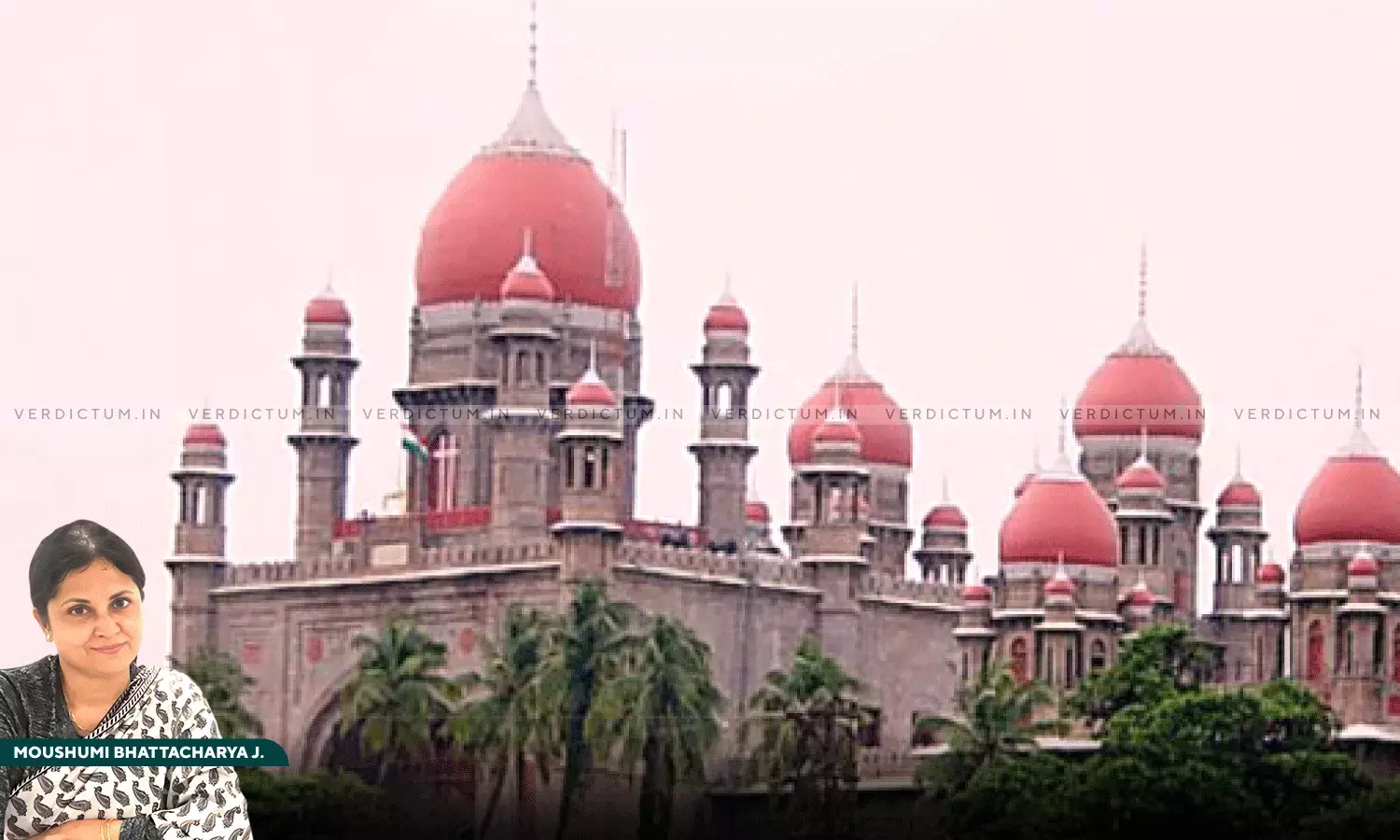Mere Regulatory Control Under Statute Will Not Adorn The Body With Trappings Of ‘State’ Or ‘Instrumentality Of State’: Telangana HC Dismisses Petition Filed By Former Employees Of Public Trusts

Justice Moushumi Bhattacharya, Telangana High Court
The Telangana High Court dismissed a Petition filed by erstwhile employees of Public Trusts/ Charities and observed that mere regulatory control, under a statute or otherwise, will not adorn the body with the trappings of a “State” or an instrumentality of a State.
The Petition before the High Court was filed for the appointment of an Advocate Commissioner to administer and manage the affairs of the respondent public trust/charities and to reinstate the former Trustees/founding Directors of the said respondents. A plea was also raised to take appropriate action against the respondent- Regional Director in failing to conduct inspection and Audit of the Directors of the respondent Trusts under the Companies Act.
The Single-Judge Bench of Justice Moushumi Bhattacharya asserted,“The Court, therefore, concludes that the writ petition is for settling of a personal score with a stark absence of a case being made out that the respondents are amenable to the writ jurisdiction of the Court.”
Advocate J.Sudheer represented the Petitioners while Senior Advocate A.Venkatesh represented the Respondents.
The three petitioners, erstwhile employees of the respondent public trust/charities, claimed that they had been terminated from service without enquiry. The respondent No.6 is a Public Trust registered under The Bombay Trusts Act, 1950. The respondent No.7 is a Public Charity (Non-profit) called “Operation Mercy India Foundation”. The respondent No.8 is also a Public Charity registered in the name of “Good Shepherd Community Society”. The respondent No.9 is a Public Charity registered in the name of “O.M. Books Foundation” and the respondent No.10 is an International Charity with operations in over 110 countries including India.
The Petitioners alleged that respondent No.1, a Director of the respondent charities, is mismanaging the affairs of the Trust and misappropriating funds brought in by the donors. The petitioners prayed for the appointment of an Advocate Commissioner to act as an Administrator for managing the affairs of the respondent Nos.6-9. It was also submitted that the private respondents abused their position and caused financial misappropriation and irregularities in the management of the Public Trusts.
On the contrary, the Respondents submitted that the respondent Nos.1-5 are private individuals and are not discharging any public functions.It was their case that the writ petition reeks of personal animosity and is also barred by the principles of res judicata.
On the issue of maintainability of the Petition, the Bench noted that the cause of action pleaded in the writ petition and the consequential reliefs prayed for made it clear that the petitioners had brought a dispute directed against individuals which is purely private and personal in nature. In order to successfully pass the test of maintainability, the petitioners must also show that the impugned act is by or at the behest of a “State” as defined under Article 12 of The Constitution or a “Person” or “Authority” having the trappings of a State either in form or in discharge of functions or owing a positive obligation to the affected party. However, these ingredients by way of pleadings as well as the material disclosed were absent in the Petition.
Further placing reliance upon the judgment in St. Mary’s Education Society Vs. Rajendra Prasad Bhargava (2023) the Bench said, “The mere fact that the respondent No.7 is imparting education will not make the said respondent amenable to writ jurisdiction in the absence of a public law element which is quintessential to the maintainability of the writ petition.”
“In any event, mere regulatory control, under a statute or otherwise, will not adorn the body with the trappings of a “State” or an instrumentality of a State”, the Bench said.
It was also noticed that the petitioners sought to re-agitate the very same points in the writ petition which were raised before the NCLT without complying with the timelines of the challenge provided under The Companies Act, 2013. “Article 226 of the Constitution of India cannot be used to entertain belated claims unless the petitioners offer a credible explanation” it held.
The Court further clarified that the petitioners had invoked the writ jurisdiction of the Court despite a precise statutory remedy being available to the petitioners under The Bombay Trusts Act, 1950. The Bench also accepted the contention of the respondents that the writ petition concerned disputed questions of fact since the petitioners had only proceeded on the allegations of mismanagement and corrupt practices which have been disputed by the respondents.
Observing that the writ petition is not maintainable, the Bench said, “The fundamental consideration for this view remains the personal cause of action brought to the Court without any public law element or violation of fundamental rights of the petitioners at the hands of the State or instrumentalities of the State.”
The Bench thus dismissed the writ petition along with all connected applications.
Cause Title: Gowripaga Albert Lael and two others v. Joseph D’Souza and 11 others (Case No.: W.P.No.26298 of 2024)
Appearance:
Petitioners: Advocate J.Sudheer
Respondents: Senior Advocate A.Venkatesh, Advocates Siddharth Sharma, Prathamesh Kamat

